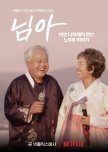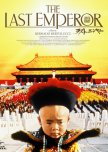
"Live life without a single regret!"
My Housekeeper Nagisa-san was a drama I could go along with for most of the episodes, and then I hit a wall. I’m not sure what the writers envisioned but they didn’t do a very good job of laying out the reasons for characters’ actions.Mei is her pharmaceutical company’s “Outstanding Employee,” which everyone is reminded of often. She is completely dedicated to her job, has little patience with people, and is extremely competitive. She is also secretly a huge slob and subsists on instant or fast food. Her mother wanted her daughters to work even after they married so that they wouldn’t be miserable like her. Mei’s sister, Yui, became pregnant in college and married upsetting her mother greatly. Yui works at a housekeeping service and hires Nagisa to clean Mei’s house and prepare her meals for a 4-day trial period. Mei hates the idea and calls him an “ugly old man.” An event occurs that causes Mei and her mother to accept Nagisa’s help. Mei finds that Nagisa gives good advice and it’s nice to have someone caring for her. A cute business rival who lives across the hall makes her life more complicated.
I liked that Mei was a team leader and her boss was a woman. Often women are all but invisible in business dramas. Of course, there had to be one female worker who had an emotional breakdown because she couldn’t handle the work, a stock trope in business and medical Jdramas. Apparently, Japanese women are very fragile and cannot handle the pressures of work, or so dramas would have us believe. Working long overtime and socializing afterwards was showcased. For Mei, it was embarrassing to have a housekeeper. Why? Men often have wives who take care of the house and all their needs. It wouldn’t be embarrassing for single men to have a housekeeper or mother to take care of them. One character was aghast that Mei would be alone with a MAN in her apartment. Well, clutch my pearls!
Having just turned 28, Mei was being pressured on all sides to marry. Her parents didn’t care who she married as long as he had a pulse. At the same time, her mother and sister hadn’t spoken for years because Yui had married in college. Damned if you, damned if you don’t. Two characters declared themselves and their intent to marry on first dates before the first course arrived! I spend more time and thought committing to what to order for dessert than these characters did deciding on a mate during a first date.
I enjoyed the developing friendship between Mei and Nagisa. People who have magical housekeeping powers always appeal to me. I did, however, have some concerns about the final romantic choice Mei made. Just a heads up, Netflix has 10 episodes listed. The last episode is mostly a recap and is listed separately on MDL as a special. I have spoilery thoughts listed below…
11 May 2025
SPOILERY THOUGHTS
The relationship between Mei and Nagisa was perplexing to me. The age gap was significant. I always wonder what people talk about from very different generations, but 20 years is doable. Despite her work successes, Mei seemed very young in attitude. She had no idea what decisions were involved with marriage. When she went on dates, she always wore a huge bow in her hair and practically pinafores like a child in the 1800’s.
If she and Nagisa had both come out as asexual it would have made more sense. They showed no sexual desire toward each other or anyone else. There was zero chemistry between the two, no longing looks, no tender touches or kisses. They had an odd mother-daughter dynamic. Even in the end, it seemed more like a business arrangement than romantic marriage. She needed to be taken care of and he needed to take care of someone. Everyone has their kink and if they were happy, that’s all the matters. The problem was, the drama tried to make it seem like it was something more than transactional and it failed on that part for me.
Was this review helpful to you?

Delicately crafted and emotionally engaging
If you've had a bad day or are feeling down, I can't recommend this short film enough. Come walk with a 90-year-old woman as she puts on her best dress and shoes to go out and buy tangerines in A Day.Grandmother finishes the last tangerine for her breakfast as the good spirited, but invalid Grandfather lies on his mat. On her way to the fruit stand to purchase more tangerines she meets women in various stages of life---a child singing on her tricycle, a harried woman in her car, a middle-aged woman hustling for every cent, and a young girl creating paper airplanes out of memories. Grandmother observes and interacts with them with humor and generosity.
The acting is beautifully natural and compelling with few words spoken. Gentle, classical music flows in the background. History reminisced becomes reality rewarded with a tangerine. An undercurrent showing the hardships of elderly poverty never drives away the hopeful mood. Oozing with kindness and bittersweet reflections, A Day is a day trip worth visiting.
“All the time it is the same, ‘Tick tock, tick tock.’”
20 November 2024
Was this review helpful to you?

"I went far away only to find nothing was different"
The Breaking Ice was a slice of life film that was more mood than plot. Filmed during the frigid winter in Yangi, China near the North Korean border, the snowy mountainous setting was easily the fourth main character in the story of three young adults disenchanted with their lives and in need of healing and connection.Na Na leads tours in the Korean prefecture of Yanbian and doesn’t hesitate to ask for tips and good reviews with a smile on her face. Han Xiao works at his aunt’s restaurant in Yangi where Na Na brings the tour groups to eat. Hao Feng has come to town for a wedding. He spends most of his time dodging phone calls about his missed mental health appointments and staring down from the building wondering whether he has the courage to jump. He sees Na Na’s tour group and joins it the next day. When Na Na lets her mask slip around him, he finds a kindred spirit. After his phone is lost with his virtual wallet, Na Na invites him to dinner with Xiao. The three drink, dance, and later sleep it off at Na Na’s apartment. The next day they jump on Xiao’s motorcycle and travel on their own tour of the area.
“Whether I like it or not, I still have to do it.”
Zhou Dong Yu managed to lift dour Na Na above the material and give her emotional depth where the script did not. Liu Hao Ran brought a fragility to Hao Feng even though the writers were stingy with his backstory. Qu Chu Xiao’s Han Xiao wisely underplayed any jealous feelings Xiao might have had as Na Na and Hao became more intimate. The men’s friendship overcame hurdles that would usually derail them. Xiao was a good apple who even gave Hao a coat when they went hiking in the knee-deep snow, showing that the German saying, “There is no bad weather, only bad clothes,” worked in China as well. Though Xiao wasn’t a well-developed character his compassion toward a stranger was revealed in different significant layers.
“I’ve been away so long, I’m not even sure where home is.”
Xiao and Na Na had moved to Yangi and became stuck professional and emotionally. Both of their jobs had been adversely affected by the pandemic and both dealt with family separations. Hao may have had a good job in Shanghai, but he was equally disaffected. The three people were as isolated and closed off as the snow-covered mountains surrounding them. Yet they found warmth and healing connections as they spent time together.
“I don’t want to be alone.”
Director Anthony Chen and cinematographer Yu Jing Pin created beautiful shots of ice and mountainous roads and trails, lighting everything with exquisite care. The interior shots in contrast were warm, although the clubs highlighted the remoteness of the individuals as they drank and danced in the crowd. The film was gorgeous to watch and the music set the mood perfectly. The acting was all on point. My only complaint is that little was revealed about the characters, especially Hao Feng. Sometimes I had to create my own dots to connect. Despite my reservations, I quite enjoyed this film of three people reaching out and accepting each other where they were for the time they had together.
2 November 2024
7.75
Was this review helpful to you?

Neomu masisseoyo!
Jinny’s Kitchen S2 added a new cast member and took the show to scenic Iceland. With cold winds whipping across Reykjavik, the team served up nourishing hot soups to warm their customers.Lee Seo Jin-“Boss Dimples”, Yung Yu Mi-“Queen of Serenity”, Park Seo Joon “Ace Pitcher”, Choi Woo Shik-“Class Clown”, Go Min Si-“Rookie MVP”, and Relief Dishwasher-“Mr. Beanie” manned the dining room and kitchen doing their very best to give Iceland delicious Korean dishes. Unlike Mexico where the crew served up very simple dishes, the cast took cooking lessons to be able to prepare the more complicated soups which required more prep work as well. Also, unlike Mexico, where Woo Shik had to try and drum up customers on the boardwalk, the line wrapped around the block on the first day much to the cast’s surprise!
Once again, the cast showed off their cooking skills, this time under greater pressure with a continually full dining room. My absolute favorite was Go Min Si. She was quite impressive as a prep chef, Dolsot Bibimbap preparer, dishwasher, and pretty much anything else the head chef of the day needed. She never complained and simply stepped up and did whatever needed to be done no matter how tired she was. Yu Mi was the epitome of calm and organized as usual. Seo Joon managed 6 or more burners with his intense organizational skills. Woo Shik had his day as head chef dancing and joking but also taking the food seriously. He and Seo Jin also took care of the customers in an orderly fashion.
There was a wide variety of customers, both Icelandic and tourists. For the most part English was the communal language for customers and cast. On the first day an Indian American showed up. While familiar with some of the cast, she’d been in Iceland for 48 hours and hadn’t had any rice and was looking forward to the meal. A Korean American customer had lived in Iceland for 4 years and as he ate said he felt most Korean when eating Korean food. People from all over the world settled in and enjoyed the different dishes and drinks. Most assuredly, the popularity of season 1 on Prime brought people to the restaurant eager to be on television, but most weren’t too overt about it. The show didn’t share how much the dishes were this time which I was quite curious about. The only bill I saw revealed was for two women which came to 20,000 Kronur/144 USD which seemed a bit pricey.
While this year was more hectic than last year, I thought it had its own charm. The pop-ups and music made for a lively kitchen scene. Min Si was a great addition as she learned quickly and made the head chef’s job easier. Of course, each of the cast members played to their own strengths and kept things positive with humor and camaraderie. Jinny’s Kitchen is a hidden gem no longer and wherever they might go for S3 they can expect their global audience to show up.
Some of the menu items to tempt you:
Beef Galbijjim
Dolsot Bibimbap
Dakgalbi
Sundubu Jjigae
Ttukbaegi Bulgogi
7 September 2024
*Neomu masisseoyo-So delicious! (according to the subtitles)
Was this review helpful to you?

"Your love has sustained me"
Long lasting love was explored in Netflix’s My Love: Six Stories of True Love. Couples from six different countries who had cohabitated from 40-60 years were shown going through their mundane days and facing challenges that arose in their lives. The couples were a mixed bag with something for everyone.1-USA. Ginger and David
“First time I saw her, I loved her.”
The focus of Ginger and David’s segment seemed to be on the financial aspects and paperwork for dealing with aging and dying. The large family gatherings and business on the farm were also highlighted. This segment wasn’t my favorite and some aspects felt staged.
2-Spain. Nati and Augusto
“You have to be strong at this age---like a warrior.”
I loved this couple, they were by far my favorite. They teased and goodheartedly bickered as they showed the importance of humor and companionship in a successful relationship.
3-Japan. Kinuko and Haruhei
“Alone it would be hard for you but together we can manage if we try.”
This couple faced a lifetime of discrimination because Haruhei had developed Hansen’s disease/Leprosy as child. For 15 years he’d been institutionalized even after he was cured. They showed how perseverance and hope sustained them as they faced negative attitudes, fought for justice, and dealt with a terminal illness.
4-Korea. Saeng Ja and Yeong Sam
“I still feel young at heart. But my body can’t keep up.”
Saeng Ja suffered debilitating back pain from decades of hard work and abalone farming. Yeong Sam scolded her whenever she did too much. Their surviving son didn’t want to take over the business and the two were left wondering if they had enough money to survive without the farm and boating business. The loss of a child, regrets, and physical ailments took a toll.
5-Brazil. Nicinha and Jurema
“Dreams are built, little by little.”
The two women had been together for 43 years and lived most of it with their children and grandchildren in a dilapidated house on the crowded hill of Rocinha with a view of the ocean. Three hours away in a quiet village they had bought a small plot of land where they were building a house little by little for retirement. Regardless of their poverty and age they had a determination to fulfill their dreams. An interesting couple that unlike the others were open about infidelity.
6-India. Satyabhama and Satva
“We are getting older but the work doesn’t cease.”
Satyabhama and Satva lost their millet and cotton crops during an unexpected deluge. Their grown children were forced to leave to work in the factories along with everyone else their age. Only the old and the very young remained. The couple were too old to handle the fields themselves leaving them in a precarious position. This segment focused on the “ceaseless cycle of migration.” This segment felt overproduced and the names of the couple weren’t authentic so I was left wondering how much of it was real.
Each story had a different director which showed in how the episodes were developed. At over an hour, some of the episodes were too long with not enough compelling material to fill them. Others went by quickly. The first and last episodes were the weakest for me as they both felt overly staged. Many of the couples faced a lack of financial resources as bodies aged and were unable to work like in their youth, illnesses, and their own mortality. Regardless of their circumstances all but one of the couples were still close and supportive of each other even after decades of dealing with life's challenges which was encouraging.
18 August 2024
Was this review helpful to you?

Michelle Yeoh and non-stop action!
In the Line of Duty: Royal Warriors showcased Michelle Yeoh’s rising star power. Only twenty-four at the time she had no problem carrying this film. Sanada Hiroyuki joined her making for an appealing and high kicking duo!Flying home to Hong Kong, Officer Michelle Yip and retiring Interpol agent Yamamoto become involved in a high jacking. Air Marshall Michael Wong is along for the ride as well. After defeating the two criminals, they are hailed heroes. What they don’t realize is that the now deceased “Tiger” has buddies who are seeking vengeance. From there family members are murdered, a break neck car chase takes place, later a shootout in a nightclub raises the body count, and finally an explosive battle determines who will live and who will die.
Royal Warriors was a quintessentially 1980’s cop film. It was ultra-violent, there were numerous explosions, it had a destructive high speed car chase, and a shootout in a nightclub with flying glass and bodies everywhere. You did not want to be the loved one of a cop in this era because the odds of you making it out alive were zero to none. And the nostalgia factor also shown through for me. There was a poster for my favorite movie, LadyHawke, in the background. Items you don’t see anymore like audio cassettes, boom boxes, video tapes, phone booths, and cell phones that resembled WWII walkie-talkies made their appearances.
The complex fights were no problem for Michelle Yeoh as she was athletic, fast, and agile making the moves look natural. She was in great form in this film. Sanada Hiroyuki was also able to deliver fists and kicks believably. Mang Hoi’s choreography made for thrilling fights as the two officers battled the different bad guys in deadly confrontations. No two fights were alike and the stars of this film were exciting to watch. One fight even included a chainsaw and another, a coffin! There was also plenty of gunplay for those who prefer their violence to be packed with not just punches but high-speed lead.
Lam Wai and Michael Chan conveyed their villains in quiet deadly fashion. Pai Ying preferred to chew the scenery with his maniacal “Bandana”. As I mentioned, Michelle and Hiroyuki played their roles quite well. Michael Wong’s Michael seemed out of place. Everyone else was in a brutally violent film and he acted like he was in a romantic comedy. The character seemed badly out of place. I suppose the writers felt the need for some humor in the dark and deadly film, but Michael came across as annoying instead of funny. The attempt at a romance also failed.
Though the technology and ultra-violent deaths for civilians date it, the movie largely holds up today. The action was nearly constant and well choreographed making for an entertaining movie. The writers did Michelle a solid and didn’t make her have to be rescued or have the male lead take down the bad guy in the end as so many films have done with strong female leads. There were no histrionics, just a powerful woman doing her job and taking out the trash. Michelle Yeoh shone brightly and would develop her screen persona even more after this film. If you like martial arts films, 1980’s crime films, or the girls with guns genre, this is one try.
4 March 2024
Was this review helpful to you?

"You are responsible for what you do"
The Last Emperor was epic in scope with filming for the first time in the Forbidden City, stunning costumes, and an enormous cast. It covered sixty years of Chinese history largely through the eyes of one man…the last emperor of China.The film bounced back and forth in Emperor Pu Yi’s life in chronological order from his coronation at the age of 3 with his future life as a prisoner of the PRC. From the time he ascended the throne he was told he could do anything, anything that was except leave the Forbidden City. All of his needs were taken care of with the exception of having no friends, his company primarily old eunuchs. As he aged, he was given a Scottish tutor named Reginald Johnston with whom he became close. While safely ensconced behind the city’s walls, different factions gained and lost power outside. Instead of escaping those walls, he escaped into marriage with his Empress and concubine.
After the Beijing Coup in 1924 he bid a final farewell to The Forbidden City and was sent to Tientsin where he lived a hedonistic lifestyle. The Japanese army convinced him and/or coerced him into becoming the emperor of Manchukuo, previously Manchuria and Pu Yi’s ancestral home. Instead of finally becoming the ruler he had dreamed of being, he found himself a puppet of the Japanese. Things went from bad to worse there when the Japanese lost WWII and were looking for the exit door. Pu Yi was captured by the Russians and later turned over to the PRC where he was imprisoned for ten years in order to be “re-educated”.
As glorious as the sets, scenery, and costumes were, Pu Yi wasn’t always the most fascinating character. He went from being a figurehead to a puppet to a prisoner. He had no say in the government and often led an insular life. Dramatic events in China and globally impacted him on the periphery but politically speaking he was as impotent as his eunuchs had been. Prison gave him new insights into himself, others, and the war. A person who had his share of damaging tantrums, he had to learn to grow up. He’d never put toothpaste on his toothbrush or learned how to tie his shoes, soon he had to also learn to pee correctly and to garden. While imprisoned Pu Yi was shown a WWII film demonstrating how the people had suffered and the terrible atrocities committed. After the reality check his reformation and realization began to take hold.
I wish Italian director Bernardo Bertolucci had briefly explained some of the political upheavals better instead of just showing another set of beige uniforms in charge. The cinematography was good and maybe it was because they were trying to show a more realistic view of the places Pu Yi lived in or perhaps it was mood lighting, but many scenes seemed abysmally dark. The version I watched had most of the dialogue in English with some Japanese in a few scenes which was disappointing. I would have much preferred for the dialogue that was supposed to be Chinese dubbed in Mandarin. The Last Emperor’s greatest achievement was not the long glossed over historical events covering six decades, for many in 1987 it was the first look into the magnificent 9,999 room palace and UNESCO World Heritage Site.
Joan Chen’s performance as Wan Rong plumbed emotional depths as the Empress became more isolated and dependent on opium. John Lone did his best with Pu Yi, but the character was one I felt little sympathy toward. The wars and tragedies never really touched him except for preventing him from being sole ruler over China. The late Peter O’Toole showed up in the role of Pu Yi’s tutor adding some gravitas to the cast.
The film didn’t touch on the cost to Pu Yi’s people during all of the political upheavals. Even during the various battles and revolutions he ate and dressed well, always had whatever he wanted while many of his people struggled for safety and daily needs. The film ended with Mao’s rule and cult of personality. Despite eliminating the imperial court, they traded one Emperor for another of sorts.
13 February 2024
Was this review helpful to you?

"Everything is transactional"
Tokyo Vice was based loosely on the first foreign reporter to work at a prestigious Japanese newspaper. Driven by ambition and a fierce intelligence, Jake Adelstein was determined to be a success. Problems arose quickly as neither his bosses nor the police officers he relied on for information had any use for a Gaijin.This drama carries the mood of a noir between the lighting and acting. The police accept that the Yakuza aren’t going anywhere and it’s their job to work with them to keep the peace. Deadly problems begin when a gang from out of town seeks to take over another gang’s territory. Jake is slapped down and betrayed repeatedly by the police, his bosses, and the Yakuza often derogatorily called a Gaijin and other racist names. He digs in and finds leads to a series of suspicious suicides. Along the way, he attempts to make a police source out of the handsome and shady Miyamoto. But it is with the righteous and wise Katagiri that he begins to learn more about the criminal world underlying most of the businesses. Jake’s boss, Maruyama Emi, initially resents having to work with him, but slowly learns to respect his desire to uncover what is hidden beneath the police reports. Patronized by the men she works with on and off the paper, Jake treats her with respect and she finds an ally for looking for the truth. Before long, Jake has made friendly acquaintances with two other rookie reporters, a low-ranking Yakuza named Sato, and an ex-pat American with an ambition rivaling his who works as a bar hostess.
The stories in Tokyo Vice were often slow burn but never slow. The people and plots were intricately woven together and took time for the characters to discover who was pulling the strings and why. As one character said, “Everything is transactional.” People used each other for information, power plays, money, sex, and protection. Fair warning, there was no shortage of tattooed and bare bottoms. Speaking of tattoos, there was some spectacular fake ink work on display.
Tokyo Vice benefited from strong performances. Watanabe Ken can always be counted on to deliver a strong performance and he came through here as Katagiri who bravely faced down the Yakuza and also knew when to lay back and set his traps. Katagiri had a gentle side as a devoted father and husband. His home and relationship with Jake reminded me of Shimura's Detective Sato in Stray Dog. Baby Driver's Ansel Elgort, brought a twitchy energy to Jake as the character sought to make contacts and learn the truth of how Tokyo and the newspaper operated. Favors required payment, for some a lie was as good as the truth, and for others, “a path opens to the one who is honest”. Kasamatsu Sho as Sato, gave a nuanced performance as the young Yakuza who came to understand the bloody payments that would be required and also joyfully sang along with the Back Street Boys while driving in the car with Jake. A son, an enforcer, and a lover, a myriad of emotions could cross his face in a matter of seconds.
Answers were hard to come by and season 1 ended with upping the ante for everyone and leaving others in peril. I’m looking forward to where this drama takes me in season 2 if they can sustain the tension and character growth begun in the first season.
10 February 2024
Was this review helpful to you?

This review may contain spoilers
To live and dye in Taiwan
If you created a weave out of a screwball rom-com and a gangster film with vulgar humor, you might end up with something like Miss Shampoo. Vivian Sung and Daniel Hong certainly gave it their all and they did make a strange but fitting couple. Hair warning, if you are looking for a sweet rom-com of opposites attracting, the humor is quite crude. And yes, there may be a few styling puns plugged in hair and there.On a dark and stormy night, a wounded gangster stumbled into the shop where Fen was a shampooer. She managed to cover for Tai when the assassins barged in searching for him. Tai later returned with enormous gifts and had Fen cut his hair. Soon all the gangsters and those dependent on them were coming into the faltering shop to have her work on them. She was either a visionary or a terrible stylist as the cuts were often vibrant and bizarre. It took nearly half the movie for the two to finally hook up which was actually pretty funny as it included an introduction to her equally odd family. They didn’t have a problem with her dating a “hard working” gangster as long as he didn’t become scary and kill the family if they broke up. The gangster plot included finding the murderer of the previous boss, an urban renewal project with election ramifications, a lieutenant’s dissatisfaction with the direction of the gang, and lopping off fingers-so many fingers.
Daniel Hong was a good sport as was his gangster boss Tai. He wore several hideous wigs, including a bizarre bowl cut mullet, blonde dreadlocks, and a 1990’s ahjumma perm. Vivian Sung made for a perky shampooer with a strange vision for hairstyles. Tai had a soft side and Fen had a wild side which brought the couple closer together until the classic misunderstanding was inserted between them which would take time to straighten out. The uneven humor did have some highlights. There were unspoken dialogues that were quite funny---one between Tai and Fen’s mom and one between Tai and his lieutenant, Long Legs. Some of the humor was too crass for me and there were many crude sexual references. The director didn’t wave away the brutal lifestyle of a gangster and the permanent retirement plan for the bosses. A two-hour run time was also a drawback for this film. Few violent rom-coms can withstand 120 minutes of tangled plot progression. That’s not to say there weren’t entertaining moments and even touching ones because there were when the plot moved at a nice clip. The story even threw in an emotional twist near the end.
Miss Shampoo could be bubbly and bloody, hairlarious and cringe-worthy. The lovers both dealt with living on the fringe of society, unable to move ahead socially. While the movie gave supporting characters memorable moments it was too long and was in dire need of a cut. If you don’t mind lewd humor braided into a romance with a side of bobbed fingers this might be a movie worth giving a curl.
28 Dec 2023
Was this review helpful to you?

This review may contain spoilers
"Life itself, shines down on its own"
Ghost Walk told the story of an unremarkable woman who became entangled in rather remarkable supernatural and natural events. The film was more of an exploration of Hye Jung’s existential dilemma than horror. Though there were high stakes for several characters involved, the movie played out like a gentle slice of life.The story began on October 8th, Korean Thanksgiving. Hye Jung works at a textile factory and has cut all ties with her family hoping to make it on her own and be free of them. After work, a co-worker walks her home, gives her a birthday gift and declares himself. She tells him she's incapable of having a relationship and turns him down. In fact, she has no close relationships with anyone, including her roommates. Three days later she wakes up to find to find those roommates being questioned by the police and a large blood stain soaked into her bedroom carpet. From there her un-life will become entwined with a little girl, a loan shark, and her roommates. Each day she wakes up one day earlier than the previous day as she discovers how they are all linked.
Ghost Walk may have had a murder mystery to solve, but it seemed to focus more on the isolating nature of financial and familial social pressures. Hye Jung preferred being alone and suddenly she was well and truly alone. To her credit, the reserved young woman handled the supernatural events in her life with aplomb and without breaking down. The effects of gentrification also played a small role. Hye Jung’s connection to the world was Soo Yang, the daughter of the loan shark, with their destinies depending on one another. The music, like Han Hae In’s acting, was never overwhelming, never loud, only softly and mildly accenting the action in select places.
There were times the film attempted to be too clever and enigmatic, especially the film’s ending quotes. It's unhurried pace will not be for everyone. Ghost Walk didn’t break any new ground, this type of story has been told before but it was a quiet ghost story that helped an unremarkable woman gradually break out of her shell. Whether her actions would aid her or anyone else remained to be seen.
10/9/23
Was this review helpful to you?

In this fantasy drama, the most unbelievable thing for me was not the sex crazed and pervy ghosts lurking about, it was that the lovely Lee El and Kang Kyung Joon, 37 and 36 years-old respectively (in 2019) were supposed to be playing university students. I might have bought it if they were working on their second PhD or if they’d been professors, but as youthful as they appeared they didn’t look like college kids.
Despite the distracting age issue, the actual love story was sweet, funny, and bittersweet. Unfortunately, it didn’t take up enough time so more time was given to middle-aged people banging all day or the cops trying and failing to play ghostbusters. Son Byung Ho who usually plays wealthy CEOs, played a shaman with a good heart in a nice change of pace. The comedy was hit or miss and the sex romps began to wear thin. I really wish they’d devoted more time to the budding romance, it would have strengthened the story greatly. If you’re looking for a ghost story with humor (some funny, some not) and pathos, with a short running time, this might be a film to check out if you keep your expectations low, real low.
10/9/23
Was this review helpful to you?

This review may contain spoilers
"So many people have died, even hell is packed."
The Flowers of War was released shortly after the 74th anniversary of the Nanking Massacre. A drunk Westerner with no political alliance, a dozen church school girls, and a dozen prostitutes take refuge in a cathedral compound as the rest of the city lies in ruins. Surrounded by Japanese soldiers, the unlikely group of people will have to work hard to find a way to survive.This film is not for the faint of heart. Dead bodies line the streets and civilians are shot whenever found. Children are raped and adult women are gang raped, tortured, and murdered. Where this film did not work for me, and I say this as an ardent Zhang Yi Mou fan, there was too much sexual flirting and beautiful images in such a stark and unsavory story. The film was based on a novella inspired by an American missionary's diary. The missionary, Minnie Vautrin, fought to protect students and refugees at Ginling College where she was president. Instead of someone like Minnie, we were given John Miller, a drunken reprobate. He transformed into a heroic knight willing to do whatever was necessary to save the girls overnight. His character growth was shockingly unbelievable. The prostitutes had the same saintly transformations just as quickly. We never learned the names of most of the school girls or prostitutes. It ended up being simple. Virgins must be saved. Prostitutes are expendable. I thought John's makeover time came across too lighthearted when the mortician was basically working his magic on women who were going to a terrible death. The Japanese were almost uniformly categorized as evil. It's not surprising. With a national trauma of 200,000-300,000 killed and countless women raped, that's a wound that does not heal easily.
Christian Bale was serviceable as John. Though a big name, his acting style doesn't appeal to me. John wasn't a very sympathetic set of western eyes to view the atrocities through. Ni Ni in her first role showed she had acting chops, even more impressive in a role that called for her to speak English much of the time. Her Yu Mo was seductive, strong, and sorrowful. I hated that they had Yu Mo fall for the uncouth John, it was more relatable when she used him for his western face to help save her and her friends. Huang Tian Yuan as sweet George made the most of his pivotal and heroic role.
Every action in this film was designed to elicit an emotional reaction and get the viewer's tear ducts flowing. It felt too contrived most of the time. It was hard to emotionally bond with female characters, both young and older, who had no names. The time was catastrophically devastating and those who survived the murderous onslaught faced horror after horror, there's no easy way to put that on film. Had there been more believable character growth and fewer flirty moments, I could have gotten on board with this film better.
9/27/28
Was this review helpful to you?

This review may contain spoilers
"Sis, daringly keep going ahead"
Red Sorghum was the film that launched Zhang Yi Mou's and Gong Li's careers. For his directorial debut, Zhang's movie won many awards including the Berlin IFF's Golden Bear Award for Best Picture. Saturated in deep colors and textures and accompanied by music that fit every scene perfectly, this 1987 film showed what the world was in for with his mesmerizing style of moviemaking.A radiant 22-year-old Gong Li played Jui/Grandma, a bride being carried along in a palanquin to be married to a 50-year-old man with leprosy. Jiang Wen as Yu/Grandpa was the expert carrier. The men sang a bawdy song of her fate as a young "ugly" bride marrying an old leper. As she bounced up and down in the small litter you could feel her nausea growing. When they reached the wild red sorghum fields a bandit attacks the group, but the men are not so meek as to let him take the bride into the fields. After the wedding she is allowed to return home with a donkey as a wedding gift/payment to her father. Along the way she is once again set upon, this time alone, and Jui runs frantically through the wind driven sorghum chased by her assailant. The masked man turns out to be Yu. He stomps the sorghum down into a verdant bed with all the gentleness of a wild beast. It was difficult to tell whether Jui initially gave her consent, I hope so, because afterwards, she fell in love with Yu. On her return to her legal husband, she's told he was murdered by an unknown killer. The workers prepare to leave but she convinces them to stay in a profit-sharing business. A drunken Yu shows up and she kicks him out. She's kidnapped for ransom by other bandits. After her return, Yu pees into the wine crocks as if marking his territory and carries her off like a sack of potatoes. Instead of ruining the drink, it is now transformed into an exquisite elixir and business booms.
Yu was often portrayed as a primitive male, dirty and brash, and Jui rarely called him on it. Thank goodness, Zhang displayed a more favorable view of women in future films. It was also a credit to Jiang's performance that Yu was considered even somewhat likeable. With the exception of her relationship with Yu, Jui came across as a competent and independent woman.
Jui gives birth to Yu's son and all seems well. It's a magical winery where anything can happen. Life is often lusty and humor filled. Then the movie switches from How I Met Your Mother to The Deer Hunter. The Japanese invade the peaceful village and one of the villagers is flayed. The film ends in a blood bath, as if everyone had gone swimming in a vat of the red sorghum drink under an eclipse. ***
I am a big fan of Zhang Yi Mou's style. His movies are luscious to drink in, the lighting, sets, costumes, and props are all feasts for the eyes and this one was no exception. I would really like to have a set of the drinking pottery, they were beautiful. Few people can capitalize on scenery as he does, color-soaked fields and skies were suitable for framing. A young Gong Li already exuded the power and sensuousness of a grown woman. Her character took over the winery, mothered a child, and called men to battle quite believably. With a running time under 90 minutes, the characters were not well developed, we know little about them except what we see on the screen. Gong Li's and Jiang Wen's exceptional performances helped me to overlook some narrative issues. The change in mood was abrupt and jarring when the shocking violence erupted, I suppose much like in real life when horror and tragedy hit out of the blue.
Red Sorghum showed the fierce tenacity of the rural people in northern China as they faced a variety of adversities and most times were able to create victory and song out of difficult situations. The film was imperfect, but very much worth the effort to experience the premiere stunning collaboration of Zhang Yi Mou and Gong Li, one of the best partnerships in filmdom.
6/30/23
*** A word of warning, there were disturbing scenes. Animals being butchered and skinned were shown up close as well as the human flaying which I could not watch. There were two urination scenes as well. And depending on how you interpret it, a possible rape.
Was this review helpful to you?

"A faithful heart makes wishes come true"
I first watched this film when it was theatrically released in my country years ago. All I had to go on was a friend's recommendation and zero background in the wuxia genre. To say I walked into the nearly empty theater apprehensive would be an understatement. My fears were for naught. In a matter of minutes, I was completely mesmerized by the cinematography, music, and acting. Having watched my share of fantasy and super hero movies, I had no problem with the flying and light body technique as the characters danced across rooftops or fought high in a bamboo forest. The graceful movements and fighting techniques were like nothing I had ever seen. Crouching Tiger, Hidden Dragon was the gateway into a new world for me. Little did I know that it would set the bar for all films that followed.Though this movie was a wuxia, the heart of the film were the two romances. Yu Shu Lien, the owner of a delivery escort service and Li Mu Bai, a warrior trained at Wudan had fought their feelings for years. Their love was unrequited as Lien had been engaged to Li Mu Bai's friend, but he was killed and the two would not act on their feelings. Now they are reunited as Mu Bai brings her his famous sword, The Green Destiny, and asks her to deliver it to their protector. His journey toward self-enlightenment has brought him to her and he wishes to leave the bloodshed behind them. The 400- year-old sword is too much temptation for Jen, a young woman engaged to be married but secretly trained by the devious Jade Fox. The incognito Jade Fox had poisoned Mu Bai's master years before for his refusal to teach her the secrets of Wudan. Lien is aware who stole the sword and works to return it without bringing any dishonor to the families involved. The middle of the film focuses on Jen and her previous love affair with Lo Xiao Hu/Dark Cloud, a charismatic desert bandit, and in the present when she takes the sword a second time to find her way as a wandering warrior. Mu Bai and Lien know she needs someone righteous to train her before she becomes a poisonous dragon. The treacherous Jade Fox has only vengeance on her mind for Jen and Mu Bai. By the end of the film the characters will collide in a deadly conclusion.
On a recent re-watch, I could see all of the classic wuxia elements from the over 200 martial arts movies I have watched since that long ago day in the theater. Ang Lee used those elements but blew them up into a grand epic, showcasing a wide variety of stunning scenery taking the genre where it had not been before. Characters traveled through the mountains, desert, verdant valleys, and lush bamboo forests. The inn and outdoor café sets ubiquitous in so many old kung fu films made their appearance in grand style this time. The busy city streets didn't feel like a small set, but substantial with plenty of extras to add an additional layer of realism. Ang Lee made full use of the sets and scenery to bring about an energetic and beautiful atmosphere for the story to be told in. Unlike so many martial arts movies prior to CTHD the characters in this film were more important than the fighting. He not only succeeded in making a gorgeous framework for the story but also in developing characters we could feel empathy with as they struggled with their deepest feelings. They had depth and emotional weight to them instead of the thinly drawn characters of old. By paying attention to the smallest details and insisting on a quality presentation, Ang Lee set the bar higher for those who would follow him.
Michelle Yeoh was a revelation to me, and I will always be thankful for this film introducing me to her. She had been in the business for over 15 years at this point honing her craft and risking life and limb at times to do so. Though her fighting technique was fearless, quick, and agile, it was her expressive face revealing longing, fierceness, and tenderness that quickly drew me in and made me a life-long fan. Her portrayal of the mature and wise Yu Shu Lien was perfect. Chow Yun Fat as the spiritual warrior Li Mu Bai, showed how he was torn between his love for Lien, his desire for enlightenment, and his need to avenge his teacher. His calm demeanor was in stark contrast to Jen's firebrand personality always teetering on being out of control. Zhang Zi Yi in only her second film held her own with the veteran actors. As Jen she conveyed naivete, passion, and anger fluidly. Chang Chen as the ardent Dark Cloud resonated the wildness of the desert and his fervent love for Jen. Again, there was the contrast of Jen and Lo's fiery passion in comparison to Mu Bai and Lien's controlled, repressed love. Rounding out the stellar cast was Cheng Pei Pei as Jade Fox. I have gone on to watch her earlier movies where she had been the young female warrior who faced insurmountable odds, paving the way for other actresses. I'm so pleased they used her in this movie as the vengeful villain and gave the kung fu veteran a chance to shine.
Lien and Jen both sought freedom in their own way and both were bound by duty. Jen loathed being forced to marry wishing only to be free and Lien greatly desired to be with Mu Bai, but was prevented by a rigid sense of honor. The two couples were the inverse of each other emotionally and would gradually become more like the other whether a crouching tiger, biding its time or a hidden dragon of emotions. Lo and Jen, embodied the recklessness of youth with no regard for tomorrow. Lien and Mu Bai sought to guide them to more thoughtful actions. For restrained Lien and Mu Bai, they had reached the point where they were finally able to break through their control to unleash their feelings and unspoken words. True love trumped spiritual enlightenment as what was important became revealed in one last breath.
The only quibble I have with this magnificent film is with the long flashback interlude showing Jen and Lo's love affair. It was similar to The Taming of the Shrew and feels dated in the telling.
Yuen Woo Ping masterfully matched the fight choreography to the mood of the film. The actors did much of the fighting, check out all the face time during the battles. Instead of CGI, the floating and leaping, even in the bamboo forest-truly a thing of beauty, was accomplished by wire work. The fights were more elegant than brutal and more visually captivating than realistic. Aside from the bamboo forest fight, the fight between Lien and Jen was spellbinding. The experienced Lien used a variety of weapons as she sought to subdue the thief of the Green Destiny in a memorable fight choreography.
After my recent re-watch I found that Crouching Tiger, Hidden Dragon has stood the test of time. Though I have searched for its equal or better through the years I have yet to find a martial arts film to top this one. Only Hero's stunning aesthetic came close. Compelling characters, wonderfully acted, enchanting cinematography, a haunting score, and balletic fight scenes have made this the measuring stick for all other films. It is rare for a film to touch me deeply emotionally and this one has for over two decades. I need to remember to thank my friend again for encouraging me to visit this world of wonder.
3/31/23
Was this review helpful to you?

This review may contain spoilers
"Tastes of life"
My Wiggly Friend takes viewers on a taste tour of rice noodles in China. The documentary covered different dishes as well as the devoted chefs who lovingly prepared them. Each short episode focused on three different restaurants from three different regions. First developed in Jiangxi 1800 years ago, Jiangxi alone produces more than 1.4 metric tons of rice noodles a year! Suffice to say this documentary only opened the door to a wider array of noodle creations.Episode 1 covered Sour Noodles made by a bad-tempered chef with tomatoes that had been fermented for a year. The dish was garnished with Litsea oil. In another city, two brothers created River Snail Rice Noodles with pickled bamboo shoots. The draw for customers was the "stinky" aroma. I'm not sure if it was a bad translation but the narrator called the pickled bamboo shoots a "biochemical weapon." At the last place, an older couple made Old Friend Rice Noodles out of pork and chicken, fermented black soybeans, and fermented bamboo shoots. The "stinky" soup was said to make you "sweaty and full". All of the dishes were described as strange which could have been a subbing problem.
Episode 2 began with truck drivers stopping at a 24-hour truck stop where Mutton Rice Noodles were served by a mother and daughter. The soup began with a goat skeleton being used to make the broth. Scalding Rice Noodles was the next stop with father and son chefs. They were known for their spicy tripe noodles. The father tested his son's ability to make Rice Noodles with Eel Gravy before agreeing to hand the restaurant over to him. Finally, Termite Mushroom and Chicken Rice Noodles was cooked by an older chef for his wife using his family's traditional method of slow cooking it in a wooden chest.
Episode 3 began with a family famed for their Lard Stirred Noodles made with lard extracted from pork belly. Next a bickering mother-in-law and daughter-in-law sold Spicy Noodles out of their food truck to hungry office workers. Lastly, was the bland but strong Brine Soaked Noodles with crispy pork and pickled string beans described as something of which you "cant dodge the strong smell".
Episode 4 was for the more adventurous as it featured a small breakfast shop in a market across from an open-air butcher. The sour and bitter soup was made using cow intestines with the digested grass still inside-Beef Sapei Noodles. It was accompanied by fried beef skin. From turf to surf, the next culinary adventure was Seafood Rice Noodles made with fresh seafood and sand worms. The last stop in the episode was food from the mud-Cattail Root Rice Noodles made from Cattail roots and jellied pork blood.
Episode 5 explored different shaped rice noodles. The first up was a dish made by a rice roll master who filled Cloth Rice Rolls with meet or eggs, like one might a crepe or burrito. Stop 2 featured Diamond Rice Stir Fry and also a beef bone soup with rice lumps. The final visit was to a place where the chef made Duck Soup with Rice Pellets. Said to have a mild flavor, it was good for children and older people because it required little chewing.
Most of the restaurants shown were run by families or friends and had been in business from 20-50 years. Some of the people gave back by teaching a new generation the old techniques. The people running the businesses and cooking, like hard working people in the food industry everywhere, worked long hours. They were all doing something they loved and found rewarding, but it was time consuming. The documentary could be heavy-handed with the older couples being romantic and glossing over the families where the children of the busy owners missed out on attention. I did feel bad for the son being tested on the eel rice noodle dish. He'd been cooking since he was twenty and it took his elderly father over twenty-five years to give him a compliment!
I can't say that the majority of dishes made my mouth water but I'm fascinated with what people eat and how they prepare the dishes. It was also interesting how different places utilized the local food sources whether it was termite mushrooms or sand worms. The photography was skillful during the food preparation scenes and also gave glimpses into the varied cities and villages. Word of warning: if you are a vegan or squeamish you may want to avoid this show as there were butchering scenes and numerous animal prep scenes.
I enjoyed the insight into the creative and dedicated cooks who not only worked to keep traditions alive but innovated as well. If you enjoy food documentaries, this ode to China's love affair with rice noodles would be worth a try.
"Those who work hard definitely have some good luck."
3/25/23
Was this review helpful to you?

 97
97 343
343 13
13 3
3 2
2 3
3 6
6 1
1 5
5 1
1 1
1 2
2 4
4 5
5






















